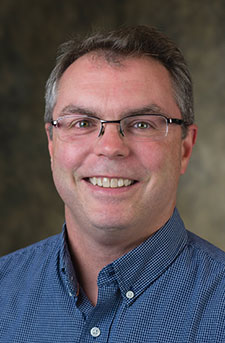Manipulating Time Topic of Penn College Colloquium
Published 10.13.2016
News
Events
Natural Science
Faculty & Staff
School of Sciences, Humanities & Visual Communications News
Scientific aspects of time and humanity’s desire to control it will be addressed at the next presentation of the Technology & Society Colloquia Series at Pennsylvania College of Technology.
“Manipulating Time Using Science, Technology and Literature” will be presented by David S. Richards, professor of physics, at 7 p.m. Tuesday, Nov. 1, in the Klump Academic Center Auditorium. The gathering is free and open to the public.
“It has been scientifically proven that time is not absolute; it is a quantity that depends upon relative speeds, gravity and even space itself,” Richards writes in his presentation abstract. “How can this fact allow a person to travel into the future? Can science and technology manipulate time so that you can live a longer life? Why is relative time so important in modern technological devices? How can literature be used to manipulate time? How do memories and experiences alter our perception of time?”
 Richards says he’s been fascinated with the topic of time since his undergraduate years, when he was introduced to Albert Einstein’s theory of relativity. His interest in the subject has grown to include the psychology and neuroscience of how our minds perceive time.
Richards says he’s been fascinated with the topic of time since his undergraduate years, when he was introduced to Albert Einstein’s theory of relativity. His interest in the subject has grown to include the psychology and neuroscience of how our minds perceive time.
A member of the Penn College faculty since 1995, Richards teaches physics, astronomy and spaceflight courses. A native of Lancaster, he holds a doctorate in instructional systems from Penn State, a Master of Science in physics from the University of Alabama and a Bachelor of Science in physics from Mary Washington College.
Richards is the principal investigator of a 2014 National Science Foundation STEM scholarship grant and has received NSF research fellowships at the University of Rochester and NASA’s Marshall Space Flight Center.
He received Penn College’s Excellence in Teaching Award in 2007 and an Innovative Excellence in Teaching, Learning and Technology Award in 2005, presented at the International Conference on College Teaching and Learning.
Richards has served as vice president and president of the Central Pennsylvania Section of the American Association of Physics Teachers, receiving a Distinguished Service Award in 2008, and he was a member of the national executive committee for Research in Physics Education.
A question-and-answer period will follow the presentation in the auditorium; the conversation can resume during the reception that will follow in Wrapture, a dining unit on the first floor of the Academic Center.
Honoring Daniel J. Doyle, professor emeritus and Penn College’s 1984 Master Teacher, the Technology & Society Colloquia Series features presentations by noted authors and academics who challenge audiences to consider the impact of technology on society.
For more about Penn College, a national leader in applied technology education and workforce development, email the Admissions Office or call toll-free 800-367-9222.
“Manipulating Time Using Science, Technology and Literature” will be presented by David S. Richards, professor of physics, at 7 p.m. Tuesday, Nov. 1, in the Klump Academic Center Auditorium. The gathering is free and open to the public.
“It has been scientifically proven that time is not absolute; it is a quantity that depends upon relative speeds, gravity and even space itself,” Richards writes in his presentation abstract. “How can this fact allow a person to travel into the future? Can science and technology manipulate time so that you can live a longer life? Why is relative time so important in modern technological devices? How can literature be used to manipulate time? How do memories and experiences alter our perception of time?”
 Richards says he’s been fascinated with the topic of time since his undergraduate years, when he was introduced to Albert Einstein’s theory of relativity. His interest in the subject has grown to include the psychology and neuroscience of how our minds perceive time.
Richards says he’s been fascinated with the topic of time since his undergraduate years, when he was introduced to Albert Einstein’s theory of relativity. His interest in the subject has grown to include the psychology and neuroscience of how our minds perceive time.A member of the Penn College faculty since 1995, Richards teaches physics, astronomy and spaceflight courses. A native of Lancaster, he holds a doctorate in instructional systems from Penn State, a Master of Science in physics from the University of Alabama and a Bachelor of Science in physics from Mary Washington College.
Richards is the principal investigator of a 2014 National Science Foundation STEM scholarship grant and has received NSF research fellowships at the University of Rochester and NASA’s Marshall Space Flight Center.
He received Penn College’s Excellence in Teaching Award in 2007 and an Innovative Excellence in Teaching, Learning and Technology Award in 2005, presented at the International Conference on College Teaching and Learning.
Richards has served as vice president and president of the Central Pennsylvania Section of the American Association of Physics Teachers, receiving a Distinguished Service Award in 2008, and he was a member of the national executive committee for Research in Physics Education.
A question-and-answer period will follow the presentation in the auditorium; the conversation can resume during the reception that will follow in Wrapture, a dining unit on the first floor of the Academic Center.
Honoring Daniel J. Doyle, professor emeritus and Penn College’s 1984 Master Teacher, the Technology & Society Colloquia Series features presentations by noted authors and academics who challenge audiences to consider the impact of technology on society.
For more about Penn College, a national leader in applied technology education and workforce development, email the Admissions Office or call toll-free 800-367-9222.